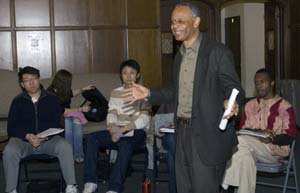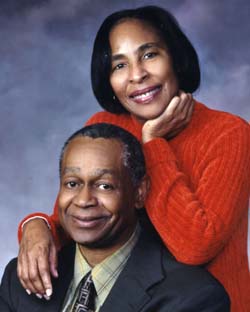“If you are supported and encouraged from an early age, you can face almost anything that is thrown at you, and go far,” says Jack Kirkland, associate professor at the George Warren Brown School of Social Work.

The main source of support, he says, is community; specifically, neighborhoods and families.
“Communities can be defined by the strength of their neighborhoods, and neighborhoods are a good gauge of the strength of families,” he says. “When the neighborhoods are strong, families get strong. The community is the ‘womb’ for families. It is incumbent on the community to provide the bulwark — the positive push and drive for families to excel and pull themselves up.”
His philosophy is a departure from traditional family-based social work.
“Think of a town where the culture is anti-achievement and full of crime and vice,” Kirkland says. “Traditional social work would go in and work with some families and strengthen them to the point where the families feel strong enough to risk moving out of the community. This approach works in a heterogeneous community, where families have varying levels of abilities or potential, but not in the type of community that is consistently weak, or homogeneous.
“In those depressed communities, families that leave are replaced by those who are weaker,” he says. “Traditional social work efforts in an impacted area would leave a community unenhanced.”
Kirkland’s approach comes from a community economic development perspective.
“To be effective with low economic homogeneous communities, you’ve got to grab hold of a community and wrap your arms around it and strengthen it socially, economically and politically,” he says. “To help these communities and families, you need to organize the people and invigorate existing neighborhood groups to identify and prioritize services needed. This must be consistently provided, especially through economic tough times”
Kirkland says that people begin to gain strength when they see purpose in their lives and learn what resources are available and how to advocate for themselves.
“When you begin to get a sense of being able to overcome your situation, then you are on your way to becoming a ‘first-class’ citizen and a model for others,” he says.
No skimming allowed
Kirkland recognized the importance of keeping the cream of the crop in communities throughout his life, from growing up in Appalachia and participating in the Civil Rights Movement to stints as the community development director for the Peace Corps in Latin America and the director of the Missouri Department of Transportation.
“The bottom line is that people need role models, and it is critical to be able to look at your own family and community for those models,” he says.
Today, Kirkland is putting his philosophy to work in East St. Louis, Ill., and a low-income area of St. Louis, the 3rd Ward.
“East St. Louis is an almost exclusively African-American community that has dealt with a great deal of changes in its history,” Kirkland says. “It has seen many layers of people with strengths leave the town. The city has lost many of its role models, and a sense of hopelessness has set in.”
He says that this is a classic example of a town that has more homogeneous deprived families than heterogeneous families of strength.
According to Kirkland, the big problem facing East St. Louis is a lack of commercial support, leaving little tax base to support schools and services.
“It is hard to pull yourself up by your bootstraps when both are in such limited supply,” he says.

A similar challenge was presented to Kirkland when he was asked to serve as a consultant to the 3rd Ward of St. Louis. Shirley Emerson, director of the Neighborhood Council, a community agency, and Alderman Freeman M. Bosley Sr. extended the invitation.
“Before we started our work with Jack, the neighborhood was filled with vacant and abandoned buildings, a lot of drug problems and all of the other social ills that go along with it,” says Emerson, a Brown School alumna who earned a master’s in social work in 1999. “Now the community has hope, and they have ways to achieve success. People are starting to want to stay in the neighborhood.”
The Neighborhood Council holds regular public meetings to stay on top of the 3rd Ward residents’ needs. The agency’s current efforts are focused on improving housing options and increasing commerce in the area while providing social support
“Jack taught us how to organize the neighborhood to spark residential and social development,” Emerson says. “Residents know Jack, and they hold him in the highest admiration.”
The community’s efforts are showing tangible results.
“People are more aware of what is needed to turn the town around, and they want to be involved in improving their neighborhood,” she says. “It’s starting to have an impact. We’ve seen 500 new units of housing become available, including two major Housing and Urban Development-sponsored projects, as well as the opening of five new restaurants and a number of other small business.”
The glimmer of hope does not stop there. Kirkland says that the commercial potential for East St. Louis also is outstanding due to its prime position on the Mississippi River and as the second-largest rail center in the country.
“The city lies at the very heart of one of the greatest distribution centers in America,” Kirkland says. “It is a great time for our students to be interning in the city’s office of community development.”
Bringing it to the classroom
Kirkland’s community work began during his undergraduate years at Syracuse University while interning at the Huntington Family Centers.
“I was assigned to working with young people from the ages of 8 to 14,” he says. “What I discovered was that they had many of the same kinds of issues and concerns that I had growing up. These individuals were coming to know more about the challenges that were ahead and how to best prepare for them. I figured that, having gone through some rough spots myself, I might have some clues how I could best help them.”
After earning a master’s degree in social work at Syracuse, Kirkland’s academic career began at Saint Louis University. He joined the Washington University faculty in 1970 as an associate professor of social work and co-founder and associate director, and later director, of the Black Studies Program, now the African & African American Studies Program in Arts & Sciences.
Kirkland is a beloved teacher, receiving the first Brown School teaching award in 1988. His goal in the classroom is to teach his students how to work with distressed and depressed communities and to revitalize them.
|
Jack Kirkland |
|
Education: B.A., international relations, 1959, and MSW, 1961, Syracuse University Family: Wife, Iris; Kirkland’s children Jack Jr., Adrienne and Kelly; and grandchildren Leroy Jr., Tierra and Cameron Favorite Hobby: “Hanging out with my grandkids,” he says. |
His classes “The Revitalization of Depressed Communities” and “The City: The New Frontier” are extremely popular with students throughout the University.
“I want students to be armed with practical knowledge so they can have an impact on communities, whether it is through having a seat in government, in private enterprises, in business or through community agencies,” he says. “Towns need people who can effectively bring together and coordinate economic and social resources.”
Kirkland has developed practicum opportunities in East St. Louis and is working on similar opportunities with other municipalities around the country.
“Jack recognizes the importance of engaging our students in both the classroom and in the community, which is why his classes are some of the most popular at our school,” says Edward F. Lawlor, Ph.D., dean and the William E. Gordon Professor. “He exemplifies the type of engagement and impact we want to have in the region.”
Kirkland is impressed with the students and faculty at the University.
“I think that the students are becoming more and more oriented toward social issues, social problems and recognizing that helping needy families requires serious energy and effort,” Kirkland says.
“I’ve enjoyed doing what I do here at the University and in the community,” he says. “St. Louis is the best laboratory in the world.”